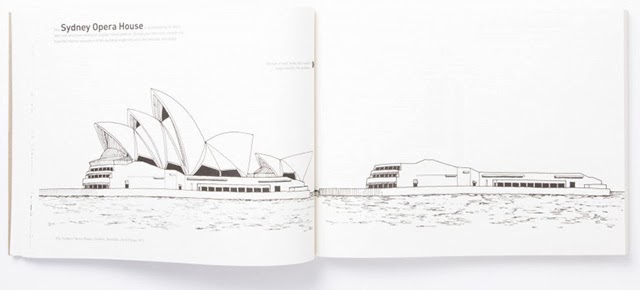Laurence King Publishers, 2013
Paperback, 160 pages

One of the things I stress to my students is that process is as important as product, and in that vein I promote keeping a sketchbook. Drawing by hand is the best means of getting ideas from one's mind out into the real world, on paper, as it is. This act allows ideas to be shared, discussed, edited, and more easily recalled at a later date. For architect and educator Steve Bowkett drawing is a means of sparking the imagination, and following from that new forms of architecture. To get an architect's or student's creative juices flowing Bowkett has crafted an "activity book" with exercises that present a building, a landscape, or part of a building, and ask for it to be completed in a new and interesting way. For example, he removes the shells from the Sydney Opera House (below) and asks "for a roof form that could be supported by this podium."

The activity book excels when the assignments are fairly constricted in terms of what he's asking for and in terms of format; blank sheets that say "design this" or "design that" are akin to architecture without a program. By providing an alternative opera house's podium or defining a room where one can draw new ways of making windows and skylights (below), Bowkett sparks the imagination by giving it some well defined parameters. Some of my favorites also include a streetscape that he wants us to "green"; a river and a highway that need bridges; and a face in need of "a new piece of face furniture." The latter makes it obvious that Bowkett isn't entirely serious throughout the book, but it's easy to see how much he believes that his drawings and suggestions can be beneficial in getting architects and students to flex their right-brain intellect.

A sticker on the cover proclaims the book is "for architects of all ages." I'd argue it's for people of all ages, though from its intended audience, students and young architects will have the most fun with it. (I have a hard time seeing a mature architect using this book for inspiration, bu I wouldn't mind being wrong.) I say "people of all ages" because the book is as valuable in teaching about architecture as it is about sparking the imagination. In many ways the book parallels last years Draw Me a House, which is more basic in its treatment of architecture, but which also teaches people about important architects, architectural elements, styles, and so forth. Both books are also ideal stomping grounds for my 5-year-old daughter (she may not have a choice of career given two architects as parents), who can have fun with them while absorbing lessons about architecture. Her alternative top to Philip Johnson's AT&T (now Sony) building, while not a drawing, is but one small step to thinking like an architect.

No comments:
Post a Comment